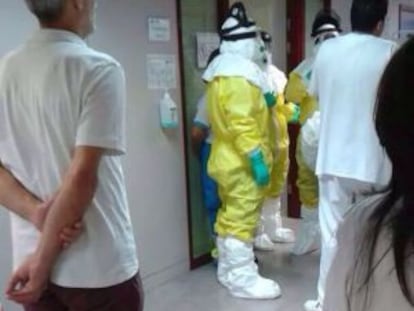Nursing assistant becomes first person to be infected with Ebola in Europe
Woman treated priest who died from virus after being brought to Madrid from Sierra Leone
A 44-year-old female nursing assistant has become the first person outside of Africa to contract the Ebola virus, and the second to be diagnosed outside of the continent, following a case involving a Liberian man who traveled to the United States while already infected.
The woman, who has been named as Teresa R. R., was part of the team of 30 health professionals who treated two Spanish missionaries with Ebola in the Carlos III hospital in Madrid. Both Miguel Pajares and Manuel García Viejo, who had been flown back from Liberia and Sierra Leone, respectively, died while receiving treatment at the health center.
The nurse’s assistant entered García Viejo’s room twice: once to treat him and the second time just after he died, on September 25, according to regional health chief Antonio Alemany. It is thought the contagion happened at that point, but the failure in protocol is still unknown.
The woman has since been on vacation, although she is reported to have stayed at home in Madrid during her days off work.
The nurse’s assistant entered the missionary’s room twice: once to treat him and once just after he died
In the early hours of September 30, she reported feeling sick and lethargic, according to Alemany, and presented symptoms of “fever below 38.6ºC.” These symptoms did not lead to her being admitted to hospital, given that she did not meet the “clinical criteria.” She did, however, meet these criteria on Monday morning, by which point she was running a high fever.
The seven-day period between September 30 and October 6 will be key in terms of identifying people with whom the patient came into contact, given that the virus can only be transmitted to others when symptoms are already present.
During the press conference yesterday when the details of the case were presented, it was not made clear whether the woman was infectious during that period, nor whether people with whom she came into contact would have to be monitored.
So far around 52 health professionals are being monitored, according to the nursing assistants’ labor union.
The director of the La Paz and Carlos III hospitals, Rafael Pérez Santamaría, called for calm on Monday, explaining that “the virus has a silent period,” meaning that it would not have been detected through tests, given that in the early stages “there is not enough virus for a positive result.” As such, he explained, the period before the nursing assistant presented symptoms would not have been dangerous.
Little information has been released about the patient, apart from the fact that she is married and that her husband is helping the authorities draw up a map of others who could have been infected. Her condition was described by Alemany as stable. “We are waiting for the evaluation that will be carried out by health professionals,” he added.
The woman was initially admitted to Alcorcón Hospital, in the southwest Madrid suburb of the same name, where she is thought to live. But early on Tuesday morning she was transferred by ambulance to Carlos III, J. Jiménez Gálvez reports. The ambulance was escorted by half-a-dozen National Police and Civil Guard squad cars and motorcycles.
Health Minister Ana Mato sought to calm fears among the public on Monday evening. “All and every measure necessary is being taken to give the best care to the assistant and guarantee the safety of those who are taking care of her and of all citizens,” she said. “We have a group of professionals with magnificent training. We are making sure that protocols are being strictly followed,” she added.
Tu suscripción se está usando en otro dispositivo
¿Quieres añadir otro usuario a tu suscripción?
Si continúas leyendo en este dispositivo, no se podrá leer en el otro.
FlechaTu suscripción se está usando en otro dispositivo y solo puedes acceder a EL PAÍS desde un dispositivo a la vez.
Si quieres compartir tu cuenta, cambia tu suscripción a la modalidad Premium, así podrás añadir otro usuario. Cada uno accederá con su propia cuenta de email, lo que os permitirá personalizar vuestra experiencia en EL PAÍS.
En el caso de no saber quién está usando tu cuenta, te recomendamos cambiar tu contraseña aquí.
Si decides continuar compartiendo tu cuenta, este mensaje se mostrará en tu dispositivo y en el de la otra persona que está usando tu cuenta de forma indefinida, afectando a tu experiencia de lectura. Puedes consultar aquí los términos y condiciones de la suscripción digital.
More information










































